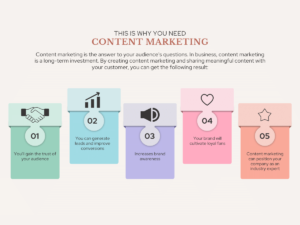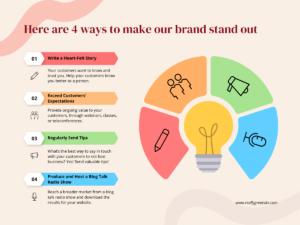Content Marketing Excellence
Introduction
Content Marketing in the digital age, where information is abundant, and attention spans are fleeting, has emerged as a powerful strategy to engage, educate, and convert your audience. it isn’t just a buzzword; it’s the driving force behind successful businesses in the 21st century.

The Importance of Content Marketing
It isn’t just about creating blog posts and videos; it’s about building a brand identity, establishing thought leadership, and attracting and retaining customers. Let’s explore these aspects with some examples:
- Building Brand Identity: Consider a small coffee shop that regularly shares stories about its locally sourced beans, sustainability efforts, and community involvement. Over time, this consistent content builds a brand identity associated with quality and social responsibility.
- Establishing Thought Leadership: An industry consultant shares in-depth whitepapers and case studies. This content showcases expertise and positions them as a trusted thought leader, attracting businesses seeking their guidance.
- Attracting and Retaining Customers: An e-commerce fashion brand produces informative style guides and product reviews. This content not only attracts fashion-conscious shoppers but also keeps them engaged and returning for more.
Content Strategy

A successful strategy begins with understanding your audience. Define their needs, preferences, and pain points. Create valuable content that addresses these aspects. Consistency is key; a regular publishing schedule keeps your audience engaged and coming back for more.
SEO and Keyword Optimization
To excel in content marketing, you can’t ignore SEO. It’s essential for better visibility and higher search engine rankings. Start with thorough keyword research, and seamlessly integrate these keywords into your content. Use the greatest on-page SEO techniques for every content article.
Measuring Success
Content marketing is data-driven. To gauge your performance, dive into analytics and metrics. Monitor user engagement, conversion rates, and other relevant KPIs. Continuous improvement is the key; use the data to fine-tune your strategy.
Social Media Integration
Don’t let your content languish on your website. Amplify it through social media. the sites where your target audience is engaged, and share your material there. Engage with your audience, respond to comments, and foster a community around your content. For example, a clothing brand posts new arrivals on Instagram, engages with comments, and creates a sense of belonging among its followers.
Tools and Resources

To achieve excellence, leverage various tools and resources. Content Management Systems (CMS) like WordPress make publishing and managing content a breeze. Design and multimedia tools help create visually appealing content. Content marketing platforms assist in scheduling, distribution, and analytics. HubSpot, for instance, is a comprehensive platform that covers various aspects of content marketing.
FAQs (Frequently Asked Questions)
- How do I start with content marketing?
Starting with this involves defining your goals, understanding your audience, and creating a content plan. Begin by identifying the topics that resonate with your audience and crafting content that provides value. - What’s the role of SEO in content marketing?
SEO is vital for content marketing as it ensures your content is discoverable. By researching and integrating relevant keywords, optimizing your on-page SEO, and following best practices, your content can rank higher in search results, driving organic traffic. - How can I assess whether my content is successful?
You can measure content success through metrics like website traffic, engagement, conversion rates, and social shares. Tools like Google Analytics provide valuable data for tracking your content’s impact. - What are the top content marketing tools?
Top tools include WordPress, Canva, SEMrush, HubSpot, and Buffer. These tools assist in content creation, SEO, analytics, and social media management. - What are some best practices?
Best practices include defining your audience, creating high-quality and valuable content, maintaining consistency, and staying updated with industry trends. - How can I keep my content strategy consistent?
Consistency can be achieved by creating an editorial calendar, setting a content schedule, and planning content in advance. Automation tools can also help in maintaining a regular posting schedule.
Conclusion
Striving for Content Marketing Excellence is an ongoing journey. It involves a deep understanding of your audience, strategic planning, and a commitment to delivering valuable content consistently. When executed effectively, content marketing can help you achieve your business goals, build a loyal customer base, and establish your brand as a leader in your industry.
Do you need assistance with proven marketing strategies from our experts? CONTACT ME for a free consultation.






